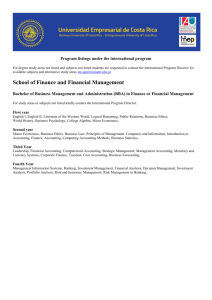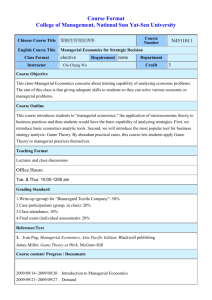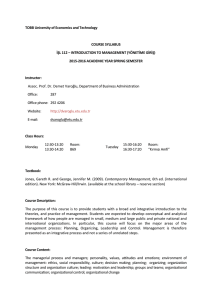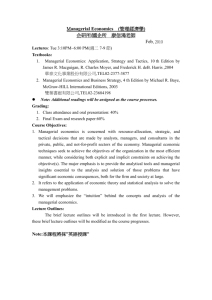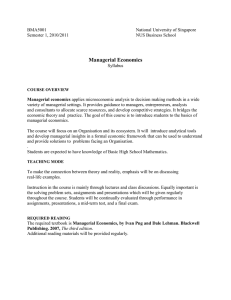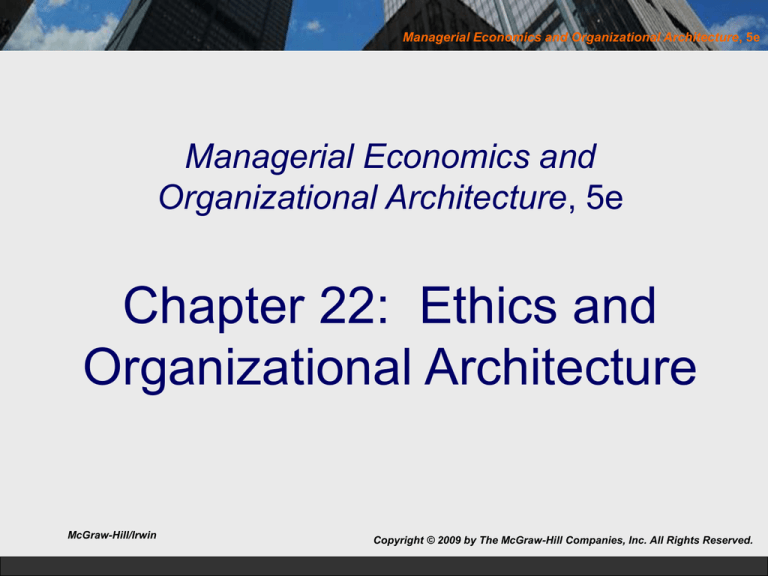
Managerial Economics and Organizational Architecture, 5e
Managerial Economics and
Organizational Architecture, 5e
Chapter 22: Ethics and
Organizational Architecture
McGraw-Hill/Irwin
Copyright © 2009 by The McGraw-Hill Companies, Inc. All Rights Reserved.
Managerial Economics and Organizational Architecture, 5e
Ethics and Organizational
Architecture
• Ethics and organizational architecture are
closely related
• Corporate performance evaluation
systems, reward systems and assignment
of decision rights can be designed to
encourage ethical behavior
22-2
Managerial Economics and Organizational Architecture, 5e
Ethics and Choices
• Individuals choose among alternatives to
maximize their well-being
• Business ethics seeks to proscribe
behaviors deemed inappropriate for firms
– Taking gifts
– Bribing government officials
– Misrepresenting data
– Discriminatory practices
– Boycotting third parties
22-3
Managerial Economics and Organizational Architecture, 5e
Business Ethics and Corporate
Policy
• What is ethics
– No consensus
– Corporations are not ethical, individuals are
– Whose interests do managers serve?
22-4
Managerial Economics and Organizational Architecture, 5e
Value Maximization
• Economic Darwinism
– By maximizing a firm’s value, all stakeholders
can share a bigger pie
– Only those firms that are able to produce
quality products at low costs will survive
• Market failure and regulation
– Result in misallocation of resources
– May result in regulation
22-5
Managerial Economics and Organizational Architecture, 5e
Value Maximization
• Compensating differentials
• Corporate Social Responsibility
– Firms should engage in activities that fall into
this category up to the point where the
marginal benefit equals the marginal costs
22-6
Managerial Economics and Organizational Architecture, 5e
Corporate Policy Setting
• In dealing with questions with potentially
contentious ethical implications firms
– Should use input from diverse stakeholders
– Be aware of different legal standards in
countries
– Understand business norms and standards
– Assess the public’s reaction
22-7
Managerial Economics and Organizational Architecture, 5e
Mechanisms for Encouraging
Ethical Behavior
• Ethical lapses often arise from
conflicts of interest
• The following help mitigate these
problems
– Repeat sales
– Warranties
– Third-party monitors
– Disclosure
– Ownership structure
22-8
Managerial Economics and Organizational Architecture, 5e
Contracting Costs: Ethics and
Policy Implementation
• Trade-offs between monitoring and
shirking
– Warranties reduce risk
• Prices customers pay will be lower if
shirking is expected
• Altruism economizes on the costs of
policing and enforcing contracts
22-9
Managerial Economics and Organizational Architecture, 5e
Codes of Ethics
• How do firms control ethical behavior?
– Have employees voluntarily adopt standards
– Write contracts that align interests of those
involved to behave ethically
– Write codes of ethics and provide training
• Why are they effective?
– Altering preferences
– Altering incentives
22-10
Managerial Economics and Organizational Architecture, 5e
Codes of Ethics
• Education
– Employees may uncertain of ethical standards
• Corporate culture
22-11

